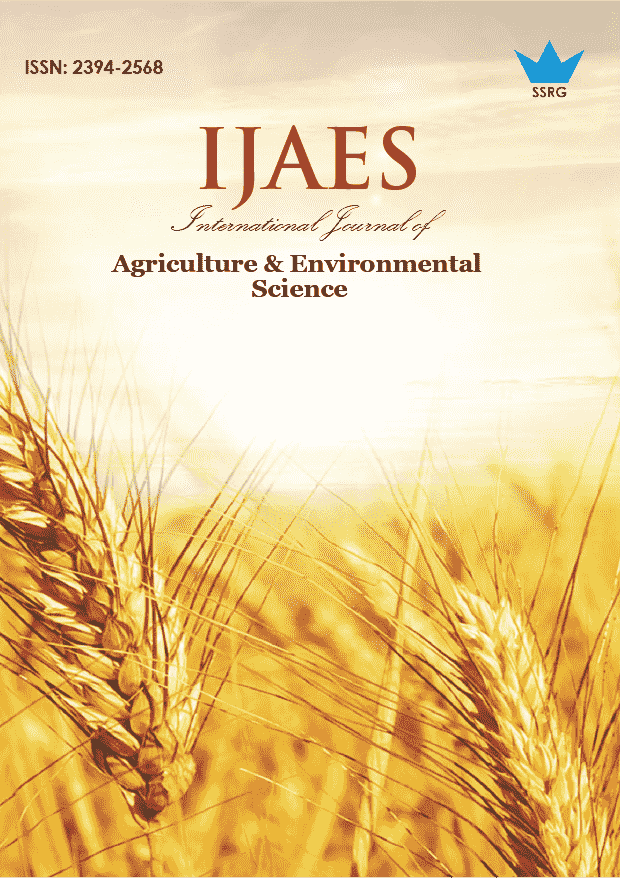Impacts of Organic Manure and Mulching Materials on Growth and Yield of Okra (Abelmoschus esculentus L. Moench)

| International Journal of Agriculture & Environmental Science |
| © 2020 by SSRG - IJAES Journal |
| Volume 7 Issue 4 |
| Year of Publication : 2020 |
| Authors : Aysha Onamica, Mohammad Shafiqul Islam, Roksana Aftab Ruhi, Sayma Binte Alam, Imam Uddin, Istiaq Hossain Joy |
How to Cite?
Aysha Onamica, Mohammad Shafiqul Islam, Roksana Aftab Ruhi, Sayma Binte Alam, Imam Uddin, Istiaq Hossain Joy, "Impacts of Organic Manure and Mulching Materials on Growth and Yield of Okra (Abelmoschus esculentus L. Moench)," SSRG International Journal of Agriculture & Environmental Science, vol. 7, no. 4, pp. 33-36, 2020. Crossref, https://doi.org/10.14445/23942568/IJAES-V7I4P104
Abstract:
The investigation was conducted to identify the impacts of organic manure (cow dung+ compost) and mulching (black polythene sheet) on okra plants.
Different treatments, considering T0-Control, T1-Mulching, T2-Organic+ Mulching, and T3-Organic manure, were carried out in a Randomized Complete Block Design with three replications from 2019 to 2020 in Noakhali, Bangladesh. The maximum plant height (86.53 cm) was recorded in T2 while the minimum, 70.33cm, was found in T0. The high leaf number per plant (61) was observed in T2, whereas in control, T0 gave less number (30.67). The utmost length of leaf (19.07cm) was noticed in T2 treatment, and the least length of leaf (16.33cm) was found in the control treatment. The topmost number of fruits per plant (52.67) was rendered in T2 treatment, while the lowest number of fruits per plant (35.33) was in the control treatment. The superiority in fruit length (17.43cm) was found in T2 treatment, and the inferiority in fruit length (14.4cm) was accomplished in the control treatment. The maximum fruit weight (16.18gm) was obtained from T2, but the minimum (16.18gm) was recorded in the control treatment.
Based on the findings of the experiment, it seems that combined treatments (organic + mulching) were promoted higher growth and yield of okra production.
Keywords:
Okra, Organic Manure, Mulching, Growth, Yield.
References:
[1] S. E. Aladele, O. J. Ariyo, and R De Lapen, “Genetic relationships among West African okra (Abelmoschus caillei) and Asian genotypes (Abelmoschus esculentus) using RAPD ” African Journal of Biotechnology, 7(10),2008.
[2] N. L. Aniekwe, “Comparative effects of organic and plastic mulches on the environment, growth, and yield of okra in a Derived Savanna Zone of Nigeria." Int. J. Sci. Res, 4(1), 1860-1864, 2013.
[3] S. E. Atawodi, C.J. Atawodi, A.G. Idakwo, B. Pfundstein, R. Haubner, G. Wurtele, W.R. Owen, “Polyphenol composition and antioxidant potential of Hibiscus esculentus L. fruit cultivated in Nigeria” Journal of medicinal food, 12(6), 1316-1320, 2009.
[4] A. El-Kader, M.S. Shaaban, and M. El-Fattah, “Effect of irrigation levels and organic compost on okra plants (Abelmoschus esculentus L.) grown in sandy calcareous soil," Agric Biol JN Am, 1(3), 225-231,2010.
[5] FAO and WHO. Diet, nutrition, and the prevention of chronic diseases. Geneva: Switz. World Health Organization, 2003.
[6] K. A. Gomez, and A. A. Gomez (1984). Statistical procedures for agricultural research. John Wiley & Sons.
[7] A.R. Holser, and G. Bost, “Hybrid Hibiscus seed oil compositions," Journal of the American Oil Chemists' Society, 81(8), 795-797, 2004.
[8] M.S. Hossain “Status, constraints and strategies of vegetable research. In Vegetable production and marketing. Proceedings of a national review and planning Workshop” held at BARI, Gazipur, Bangladesh (pp. 26- 29), 1992.
[9] M. M. Khandaker, N. O. R. A. I. Z. Z. A. T. I.Jusoh, A.N. Hafiza, A. R., and Z.S. Ismail, “The effect of different types of organic fertilizers on growth and yield of Abelmoschus esculentus. Moench (Okra)”, Bulgarian Journal of Agricultural Sciences, 23(1), 119-125, 2017.
[10] Y. A. Mahadeen, “Effect of polyethylene black plastic mulch on growth and yield of two summer vegetable crops under rain-fed conditions under semi-arid region conditions” American Journal of Agricultural and Biological Sciences, 9(2), 202-207, 2014.
[11] M. M. Mahmood, K. Farooq, A. Hussain, and R. Sher, “Effect of mulching on growth and yield of the potato crop." Asian Journal of Plant Sciences.2002.
[12] R. Miah, J.N. Methela, and A.R.Ruhi, “Effect of Integrated Nutrient Management on growth and yield of okra," Tropical Agro Biodiversity, 1(2), pp.55-59, 2020.
[13] J. Ndunguru, and A. C. Rajabu, “Effect of okra mosaic virus disease on the above-ground morphological yield components of okra in Tanzania." Scientia Horticulturae, 99(3-4), 225-235, 2004.
[14] Olabode, O. S., Ogunyemi, S., & Adesina, G. O. (2007). The response of okra (Abelmoschus esculentus (L). Moench) to weed control by mulching. Journal of Food Agriculture and Environment, 5(3/4), 324.
[15] M. Premsekhar, and V. Rajashree, "Influence of organic manures on growth, yield and quality of okra," American-Eurasian Journal of Sustainable Agriculture, 3(1), 6-8, 2009.
[16] U. N. Ufera, K. S. Chukwuka, and M. Iwuagwu, “Relative effect of organic and inorganic fertilizers on the growth of okra [Abelmoschus esculentus (L.) Moench]”. Journal of Agricultural Sciences, Belgrade, 58(3), 159-166, 2013.

 10.14445/23942568/IJAES-V7I4P104
10.14445/23942568/IJAES-V7I4P104